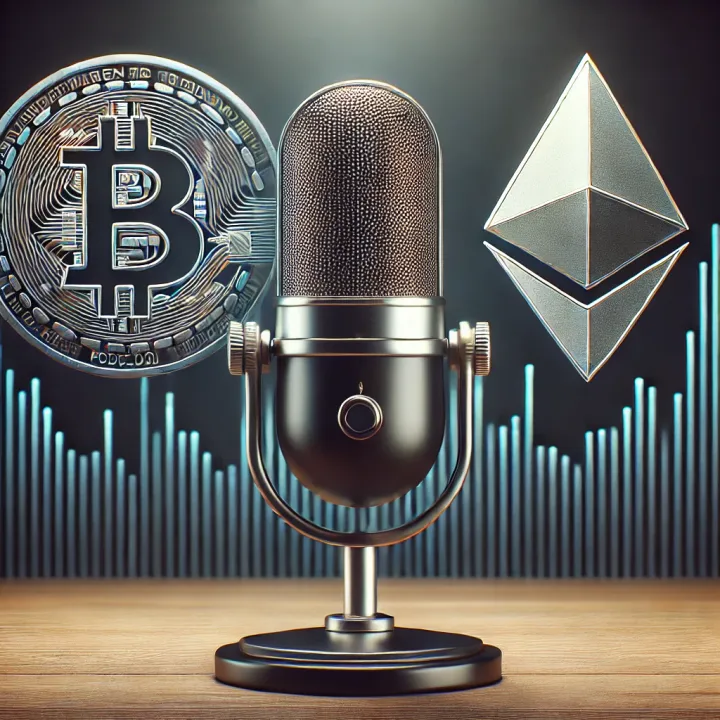Podcast: The Network Era
"... All of the things that are growing today are networks..."

This article contains the transcript of Episode 1 of the Tela Network Podcast, which you can watch here:
Welcome to the Tela Network Podcast.
My name is StJohn Piano, and I am a blockchain researcher at Tela Network.
We now live in the Network Era.
This is a fundamentally different kind of society than the one that existed even 15 years ago.
The change has been very great and very rapid.
Jonathan Haidt, an American social psychologist, thinks that the inflection point was 2012, when for the first time half of all Americans owned a smartphone.
As of 2021, half of all people on the planet now own a smartphone.
The key aspect of a smartphone is that it links people together, via a device that they carry at all times, into networks that are completely digital. Not physical at all.
There were of course initial versions of this with the television, the original telephone, email, the first web browsers, and so on, but it turns out to have been really important that these earlier devices were in a fixed location and did not travel around with you constantly.
With this context in mind, let's proceed.
This episode is an overview of Tela Network and its goals.
First, our mission:
Tela Network's mission is to protect and reward human attention. Our messaging app prevents all spam and allows you to charge for your time.
That's it. It doesn't sound like much.
But: When you consider:
- that we spend much (and for many people, most) of our waking lives on social platforms and applications
- that these platforms are actively fragmenting our concentration, replacing our friendships, and making it harder and harder for us to do our work
- and that as a result many people are unsurprisingly experiencing poor mental health
then you can see, I think, that we are advocating a structural change in the way that people use the internet.
As an aside: This is the first episode of the Tela Podcast, and with this step, Tela Network enters boldly into the scorched-earth hellscape that is the modern media environment. Abandon hope, all ye who enter here, as the saying goes.
This is a necessary step, though - we have made it to the stage now where we need to transmit our message effectively to the wider public.
1) How we see the near future
The world is entering into a sustained period of turbulence. This is fairly clear by now to everyone who is paying attention. It is becoming extremely obvious that many things will change.
As just one example (there are quite a few more), consider for a moment the demographic crisis:
Very soon, in most modernized countries, there will be more old people than young people. This changes everything - the entire basis and structure of society. For example, pensions are actually payments from young people to old people. If there aren't enough young people, who will pay these pensions ?
This year, the Prime Minister of Japan, Fumio Kishida, warned that Japan's low birth rate means that they are "on the brink of being unable to maintain social functions". Japan is simply the furthest along this trajectory - all modernized countries are in the same position.
(I know that some people listening to this will say that the solution is more immigration, but the truth is that this demographic collapse has already occurred in most countries in the world as they have modernized over the last couple generations. There simply are no longer enough countries anymore with enough children to supply migrants to all the modernized countries, or even most of them. For example, a generation ago, Mexico's birth rate was 5 children per woman. Now it is less than 2, which is the population replacement rate - so Mexico's population will be shrinking from now on. Mexico is a big country. It has about 128 million people. Where will they get their immigrants from ?)
I should note that there is an interesting exception: Israel is a modernized country but has a birthrate of 3 children per woman - above replacement. The fact that their whole society is engaged in a collective unifying mission is probably the reason. I think Israel is one of the countries that has a bright future.
In general, however, on this particular issue, I am rather pessimistic - I think that most countries will simply tax their young people extremely heavily in order to pay for all the old people, and then the young people won't be able to afford to have children, and so the crisis will simply get worse. In fact, I think this is already happening via high inflation. No one has a plan - everyone is just trying not to think about it.
The upshot is that we are all in for a very bumpy ride.
But: And this is important: All of the things that are growing today are networks.
Everything that is breaking, having trouble, falling apart - these are twentieth-century bureaucracies, built for an earlier time. They are struggling to adapt to the new environment. (As are we all, admittedly.)
The only things that really seem to have a chance in this future are networks.
So, the conclusion is easy: Start or join a network.
We couldn't see one that was tackling the problem of messaging overload, which is the problem that we think is crucially important, so we started our own.
And to go a bit further: Fundamentally we believe that you have to be in a network to make it through what's coming. If you're an individual, operating by yourself, you just lose. There's no way to deal with all of this alone. It's just not possible.
It's not like your savings are going to be worth all that much, not after another decade or two of high inflation. And I'm sure you're asking yourself - what to invest in, in those circumstances - and the answer, we think, is: Your network. That's it. I don't mean people that you hang around with at the bar, I mean people that you can genuinely rely on, when it really counts.
A network does not have to have a million people to matter.
This is actually a very interesting change from the 20th century. People today organise digitally first, and then maybe go out into the street. And perhaps never even do that.
So: Just a few hundred or a few thousand people, acting together towards the same goal, is enough, in the Network Era.
And it's certainly better than being a lone individual in times such as these.
Overall, I am optimistic.
We have to act, we can't sit still, but - we do actually have a way forward - a way to face, and overcome, the challenges of our era.
2) What we're building
Tela Network is building a new messaging app.
Every busy person that we know is overwhelmed with messages on social platforms.
We have limited time and attention. We can't handle this amount of messaging. It's exhausting.
I don't mean messages with your friends, really. I mean business messaging with the wider world, with the several thousand people that you need to keep in touch with on a light basis professionally. And all the people that might wish to connect to you. And I also mean all the notifications that the apps and companies send to you. And all the spam from new connections trying to get you to pay attention to the thing that they're working on. Such as this video, for example.
We believe that the Tela Messaging App solves this problem, because it applies a fee to each message. This filters out all spam and allows you to charge for your attention.
I am proud to announce that version 1 of the Tela Messaging App is now live at tela.app.
So, please go there and create an account.
3) A quick note about the role of blockchain
This application is only possible because of the emergence of blockchain technology. This is why it wasn't built earlier, although several very smart people at the beginning of the Internet did think about exactly this problem - the problem of how to make payments that are entirely digital. David Chaum built Digicash and Peter Thiel and Max Levchin built Paypal. Marc Andreessen, who wrote Mosaic, the first widely-used graphical web browser, and co-founded Netscape, wrote an article on Bitcoin in 2014, from which I quote:
"Micropayments have never been feasible, despite 20 years of attempts, because it is not cost effective to run small payments (think $1 and below, down to pennies or fractions of a penny) through the existing credit/debit and banking systems. The fee structure of those systems makes that nonviable."
So, the concept of paid messages is simple, but the required technology is not. Fortunately for us, our team understands it very well indeed.
But, of course, we know that we stand on the shoulders of giants. God bless Satoshi, wherever he is.
4) Why we're building the Tela Messaging App, in more detail
We think that connecting absolutely everyone to everyone else on the planet was a mistake. We only have limited time. We can't respond to a practically infinite stream of messages.
Everyone who's busy is just overwhelmed. I certainly am, myself. I do my best, but I'm not able to answer everything.
So: Something must be done. The current pace of messaging is simply unsustainable.
And to really go to the next level here:
With the recent explosion of AI generation technology, we are facing a future, very soon, in which we will be swamped with AI-generated messages from bots. This will not just be text. It will be audio and video as well. And the bots will be able to carry on a decent conversation with you - it won't be easy to tell who's real.
The capacity of the Internet to simply exhaust us, completely, may be just around the corner.
The only real solution that we can see is to apply a charge per message. Then, even if a bot sends you a thousand messages, in some sense you're not that unhappy about it. You're making money from it, after all. And hopefully the bot operator will themselves run out of money, which would be a real plus, for everyone.
There is one alternative, which is to use AI tools to try to filter out the real messages from the bot messages, but... we don't think that that's the right road to go down. We could enter into that arms race, but it will take a lot more effort, it won't work completely, and you won't get paid for dealing with your messages.
You can read more about our strategy at:
5) Why it is an attractive investment opportunity
As far as we can tell, we are perhaps the first blockchain network to tackle this problem directly and seriously. We have a significant head start.
We have the technology, we have the team, we have a working application, and we understand exactly what we're doing and why. (This is not as common as you might imagine.)
So: Investing in us now may very well be one of the most high-reward opportunities available to you in the current market. Think about it.
Although, obviously, please don't invest more than you can afford to lose. No investment is without risk.
I will be publishing the script of this video as an article on telablog.com.
In fact, you could pause the video right now and go subscribe to our blog - that's telablog.com)
We will use all investment to expand the network.
The network makes money by charging a transaction fee for each message. (This is the standard model for blockchains.)
We will then pay dividends from this fee revenue to our shareholders.
So, there are two reasons to buy shares in Tela Network:
- Our share price is likely to increase, if we succeed, so at some point you would then be able to sell the shares for a profit.
- Just by holding the shares, you have a good chance of making more in dividends than you paid for the shares. Any profit that you make by selling the shares later would then be a bonus.
We hope however that it will be more profitable for you to hold the shares permanently, join us on our mission, and grow the network.
6) What you can do to help, if you decide to support our mission
First: You can like and share this video. Don't underestimate that. It helps a lot. That's the only thing that the algorithms see.
(Sadly they cannot see or value your good wishes - only your likes.)
Second: You can continue to help us boost our social profile by joining the t.me/tela_social Telegram channel, where we post links to our new updates, along with requests to like and promote them.
Third: You can make a small direct investment right now by going to tela.network/invest and purchasing shares in us. This could be anywhere between 100 and 2000 shares.
Fourth: If you want to make a significant investment, or take on a strategic role within the network, then please make a small direct investment as an honest signal of intent (this helps to filter out people who just like to talk), and then contact me directly.
7) Our longer-term vision
We are carefully following the ideas laid out by Balaji Srinivasan in his book The Network State.
Our plan is to grow into a network union.
We will issue our own token, and in time build our own blockchain.
We want all our users to be shareholders, and to receive dividend payments from the network as they participate in it.
The value of a network is fundamentally the activity of its users, so we think the right strategy in the Network Era is to design the network to reward its users for their participation. (And I mean reward with money, not just with pictures and likes.)
So: Tela Network is tossing its hat into the ring. We are taking the field, against a sea of troubles and an ocean of noise.
And probably some other mixed metaphors.
It's a little early to say this, I admit, but I'm going to anyway: I think we're going to win.
Allow me to repeat our mission statement:
Tela Network's mission is to protect and reward human attention. Our messaging app prevents all spam and allows you to charge for your time.
We hope that you find this mission as inspiring as we do.
Let's see just how far we can go.
Thank you for watching. Take care, and good luck.
Tela Network
Escape the noise. Protect your attention.
Follow us on Twitter:
@tela_updates
Join our Telegram update channel:
@tela_social
You can read more about our strategy at:
tela.network
Go to the app:
tela.app
Our mission:
tela.network/mission
Our blog:
telablog.com
References:
http://jonathanhaidt.substack.com/p/phone-free-schools
"evidence of an international epidemic of mental illness, which started around 2012, has continued to accumulate."
http://jonathanhaidt.substack.com/p/the-teen-mental-illness-epidemic
"In the rest of this Substack post, I offer a preview of the evidence that a mental illness epidemic emerged around 2012."
http://www.judiciary.senate.gov/imo/media/doc/Haidt Testimony.pdf
Jonathan Haidt's 2022 US Senate testimony.
"Teen Mental Health Is Plummeting, and Social Media is a Major Contributing Cause"
http://www.pbs.org/newshour/show/smartphones-making-generation-unhappy
"2012, according to the data, is the year when the majority of Americans had a smartphone."
~ Dr Jean Twenge
"According to new research from Strategy Analytics, half the world’s entire population now owns a smartphone in June 2021. Some 4 billion people use a smartphone today. It has taken 27 years to reach this historic milestone."
http://data.worldbank.org/indicator/SP.DYN.TFRT.IN
Fertility rates (mostly 2021 data) for all countries.
http://asia.nikkei.com/Politics/Kishida-says-Japan-on-brink-of-social-dysfunction-as-births-fall
January 23, 2023
The low birthrate puts Japan "on the brink of being unable to maintain social functions," Prime Minister Fumio Kishida warned Monday.
...
His remarks on child-rearing support, one of the core elements in his 45-minute speech, came amid news that the country's new births last year fell below 800,000 for the first time on record. Japan's total population as of Jan. 1 was estimated at 124.77 million, down 0.43% from a year earlier -- 29% of them were 65 years old or over, while 11.6% were aged 0-14.
http://www.worldometers.info/world-population/mexico-population
The current population of Mexico is 128,633,835 as of Saturday, September 9, 2023, based on Worldometer elaboration of the latest United Nations data.
https://a16z.com/why-bitcoin-matters
"Why Bitcoin Matters" by Marc Andreessen


